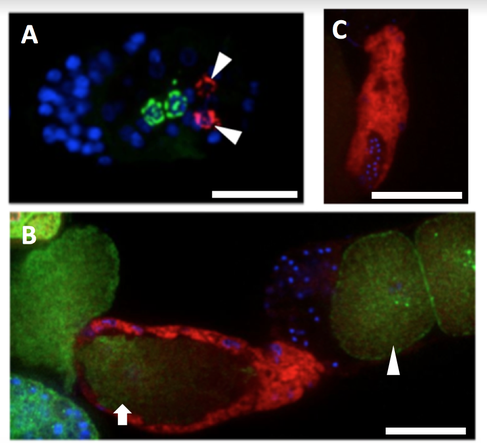Description
Stellaris smFISH probes targeting swt-3, an ortholog of the human solute carrier transporter SLC50A1, are shown in red (Cal Fluor 610), DAPI in blue, and PGL-1::GFP, a marker for P granules, in green. A) swt-3 transcripts are expressed in Z1/Z4 cells during embryogenesis (arrowheads). The embryo shows Z1 and Z4 migrating to Z2/Z3 P granule cells (marked with PGL-1::GFP in green). B) A dissected proximal gonad of a young adult capturing the ovulation of a recently fertilized zygote (arrow) as it passes through the swt-3 expressing spermatheca (red). Proximal oocyte marked with arrowhead. C) Sperm nuclei (blue) within the swt-3 (red) spermatheca. scale = 20µ The experiment confirms and extends swt-3 enrichment in cell-specific Z1/Z4 mRNA profiling experiment reported by Kroetz & Zarkower 2015.
Reagents
The Stellaris acdh-1 smFISH probe contains 44 oligos labeled with Cal Fluor 610 (sequences available upon request). Staining was performed as described by Ji and van Oudenaarden (2012). In short, PGL-1::GFP embryos and worms were fixed with formaldehyde and ethanol. Hybridization was done in the dark at 37°C for four hours. Cal Fluor 610 coupled probes were designed with the Stellaris Probe Designer from Biosearch Technologies.
References
Funding
NIH-NIGMS[R01GM113933]
Reviewed By
Andy GoldenHistory
Received: July 4, 2017Accepted: July 6, 2017
Published: July 20, 2017
Copyright
© 2017 by the authors. This is an open-access article distributed under the terms of the Creative Commons Attribution 4.0 International (CC BY 4.0) License, which permits unrestricted use, distribution, and reproduction in any medium, provided the original author and source are credited.Citation
Updike, D (2017). swt-3 transcripts are expressed in Z1/Z4 during embryogenesis and in the adult spermatheca. microPublication Biology. 10.17912/W2ZT02.Download: RIS BibTeX




